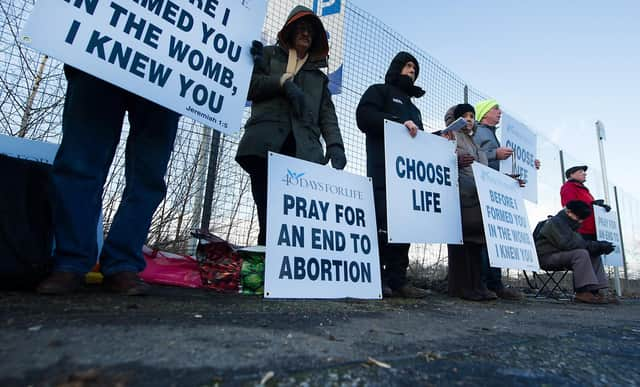Scotland abortion protests: Who are 40 Days for Life, and why are they accused of harassing women?


A second wave of daily anti-abortion protests by the Christian fundamentalist network “40 Days for Life” is now underway, prompting outcry from Scottish groups who accuse the pro-life protesters of intimidating women and spreading misinformation.
The protesters hold placards featuring images of in utero foetuses, join in silent prayer and light lanterns along the road to Glasgow’s Sandy sexual health clinic, and outside of the Queen Elizabeth University Hospital.
Advertisement
Hide AdAdvertisement
Hide AdThe 40 Days for Life campaign takes place twice a year, first during the Christian season of Lent – starting on Ash Wednesday and ending on Palm Sunday – and then from the fourth Wednesday of September.
This year, it will last from September 27 until November 5, where members will hold “prayer vigils” outside abortion clinics.
Although the group’s Scottish activities are largely centred on Glasgow, 40 Days for Life was founded in Texas, USA in 2004, and is funded by “a combination of donor contributions and application fees”. The group also claims to have “generous benefactors” in the US.
The group boasts it has “saved 23,657 lives since 2007” and directly caused the closure of 145 abortion centres and caused 251 “abortion workers” to quit their jobs.
However, 40 Days for Life’s Scottish-based activists describe it as “a locally organised community initiative”, where Christians ”pray in public, normally outside abortion centres, or places where abortions happen in the local community”.
“In the United Kingdom, hundreds of women have been helped using such methodology in a peaceful, legal and prayerful approach,” said a UK spokesperson for the group, “and we have reports of hundreds of positive encounters in Scotland, in the street talking to people in a loving, caring and compassionate manner about a difficult and controversial matter.
“In Scotland, entire organisations have been set up with the purpose of discrediting and criminalising silent prayer.
“We believe that prayer is a foundational stone in changing the culture, reaching out to one person at a time.
Advertisement
Hide AdAdvertisement
Hide Ad“We believe in the value of free speech, and we do not believe in the tyranny of legislative attempts to control thoughts, prayers, freedom of assembly and freedom of movement.”
However, the group has been accused of harassing women and chanting at them as they try to access healthcare by pro-choice campaigners.
Back Off Scotland was first formed as Back Off Chalmers, in response to anti-abortion protesters outside of the Chalmers Health Clinic in Edinburgh.
The group was founded by then Edinburgh University students Lucy Grieve and Alice Murray, who say they were subjected to harassment by anti-choice campaigners.
Now, the group campaigns for buffer zone legislation, which would see anti-abortion protesters unable to conduct demonstrations immediately outside of health care centres.
A spokesperson for Back Off Scotland said the new wave of protests from 40 Days for Life shows the government is not doing enough to prevent women from being harassed when accessing abortion services.
“Twice a year, every year, Scotland sees a new wave of organised protests outside healthcare facilities that provide abortions,” the spokesperson said.
“We are tired of being made to watch these happen with no power to change it.
“We’re tired of empty words and no action.
Advertisement
Hide AdAdvertisement
Hide Ad“We’re tired of being left behind – while the rest of the UK is making progress, we’re stuck with no movement from the government.
“People in Scotland deserve safe, accessible abortions, free of intimidation and harassment.”
Previously, the Scottish Government has left local authorities to bring in buffer zones using byelaws.
However, local authorities such as Glasgow City Council and Edinburgh City Council declined to introduce byelaws due to legal advice they received, and the possibility of lengthy and costly legal challenges from pro-life groups with wealthy backers, particularly from American Christian groups.
Eventually, former First Minister Nicola Sturgeon gave the Scottish Government's backing to a member's bill protecting access to terminations last year.
Humza Yousaf then committed to introducing national legislation when he became First Minister, and said his government will support Scottish Green Party MSP Gillian Mackay’s proposed bill.
Around 13,000 women have an abortion in Scotland every year. It is their legal right and has been since 1968, with polls indicating the majority of people in the UK support it, and there is cross party support for Ms Mackay’s bill.
The bill would create 150m “safe access zones” around healthcare clinics providing abortion services, but the proposed legislation now faces months of parliamentary scrutiny before being voted into law, with many of those who campaigned for buffer zones frustrated at the pace of progress.
Advertisement
Hide AdAdvertisement
Hide AdMs Mackay said: “My heart, my support and my solidarity are with everyone who will have to face the gauntlet of protests and banners.
“You should not have to go through it.
“My bill will ensure that nobody else has to.
“These protests are utterly wrong, they are designed to target, shame and intimidate people and to stop them from accessing the healthcare they are entitled to.”
She said she is “determined that we get it right” and hopes to get her bill passed into legislation as quickly as possible.
Ms Mackay added: “Enough is enough - their days of harassment are coming to an end.
“My bill will stop them for good.
“I am very grateful to those who have trusted me with their stories and experiences.
“We would not be this close to delivering change without you – we will not let you down.”